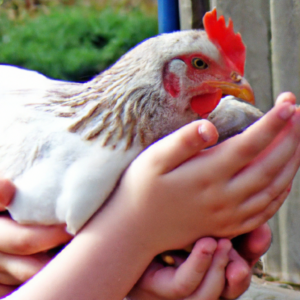
Are you a proud chicken owner looking to ensure your flock is getting the best nutrition possible? If so, the question of how to choose the right chicken feed for your flock’s needs may have crossed your mind. Knowing what to look for in a chicken feed can be a daunting task, especially with the wide variety of options available. This article will guide you through the process of selecting the perfect chicken feed to keep your feathered friends healthy and happy. Whether you’re a new or experienced chicken keeper, finding the right feed is essential for the wellbeing of your flock. So, let’s dive into the world of chicken feed and discover the best choice for your chickens’ unique needs.

Understanding the Nutritional Needs of Chickens
Chickens, just like any other living creatures, have specific nutritional requirements that need to be met in order for them to thrive. As a chicken owner, it is essential for you to understand the basic nutritional needs of your flock to ensure their proper growth and development. There are three key aspects to consider when it comes to chicken nutrition: protein requirements, energy requirements, and vitamin and mineral requirements.
Protein Requirements
Protein is an essential component of a chicken’s diet as it plays a crucial role in muscle development, egg production, and overall health. The protein requirement for chickens varies depending on their age and purpose. Chicks require a higher protein content in their diet, which can be provided through starter feeds specifically formulated for them. As they grow, the protein requirement decreases, and a transition to grower feeds is necessary. Layer feeds, on the other hand, have a higher calcium content to support the formation of strong eggshells.
Energy Requirements
Energy is another vital element in a chicken’s diet as it provides the fuel necessary for their daily activities. The energy requirement of chickens is typically met through carbohydrates, fats, and oils in their feed. It is essential to choose feeds that provide an appropriate energy level to match the chicken’s activity level and purpose.
Vitamin and Mineral Requirements
Vitamins and minerals are essential for the overall health and well-being of chickens. These micronutrients play vital roles in supporting their immune system, promoting proper growth, and preventing various deficiencies and diseases. A well-balanced chicken feed should contain a range of vitamins and minerals, such as vitamin A, vitamin D, calcium, phosphorus, and many others, to meet the specific needs of your flock.
Different Types of Chicken Feeds
There are various types of chicken feeds available in the market, each formulated to fulfill the specific nutritional requirements of different stages of a chicken’s life or their purpose.
Starter Feed
Starter feeds are designed for newly hatched chicks up to about 6 to 8 weeks of age. They contain higher protein levels to support the rapid growth and development of young chicks. Starter feeds are usually available in crumble or mash form, making it easier for young chicks to consume.
Grower Feed
Grower feeds are suitable for chickens in the growth phase, typically from 8 to 20 weeks of age. These feeds have slightly lower protein levels compared to starter feeds but still provide adequate nutrition for continued growth.
Layer Feed
Layer feeds are formulated specifically for laying hens, aiming to support their egg production and overall health. These feeds contain higher calcium levels to ensure the formation of strong eggshells. Layer feeds should be introduced when hens start laying eggs, usually around 18 to 20 weeks of age.
Broiler Feed
Broiler feeds are specially formulated for meat chickens or broilers. These feeds have a higher protein content compared to other types of chicken feeds to support rapid muscle growth and weight gain. If you are raising chickens primarily for meat production, broiler feed is the appropriate choice.
Organic Feed
For those who prefer to feed their chickens with organic options, organic feeds are also available. These feeds are made from ingredients that meet organic farming standards, meaning they are free from synthetic pesticides, herbicides, and genetically modified organisms (GMOs). Organic feeds are a popular choice among those seeking an all-natural approach to raising their chickens.
Grain-Free Feed
Grain-free feeds are ideal for chickens that have grain allergies or sensitivities. These feeds are formulated without any grains, such as corn or wheat, and instead rely on alternative carbohydrate sources, such as peas or potatoes. Grain-free feeds can be an excellent option for chickens with dietary restrictions.

Considerations for Choosing the Right Chicken Feed
When selecting the appropriate chicken feed for your flock, several factors need to be taken into consideration to ensure their optimal health and well-being.
Age of the Flock
The age of your flock is a significant factor in determining their nutritional needs. Newly hatched chicks require starter feeds, while growing chickens will benefit from grower feeds. Once your chickens reach the laying age, transition them to layer feeds. By considering their age, you can provide the appropriate feed to support their stage of life.
Purpose of Raising Chickens
Understanding the purpose of raising chickens will also guide you in selecting the right feed. If you are raising chickens for meat production, broiler feeds will be the most suitable choice. However, if your main goal is egg production, then layer feeds should be your focus. Determining the purpose of raising chickens will allow you to prioritize the specific nutritional requirements they need.
Breeds and Size of Chickens
Different chicken breeds may have varying nutritional needs. For example, large breeds may require more protein and energy compared to smaller breeds. Additionally, the size of your chickens will impact their feed intake. Larger chickens will typically consume more feed, so it’s important to choose a feed that provides adequate nutrition for their size.
Current Health and Condition
The health and condition of your chickens should always be taken into consideration when selecting their feed. If you have chickens with specific health issues or dietary restrictions, consult with a poultry nutritionist or veterinarian to determine the appropriate feed options. Certain health conditions may require specialized feeds or supplements to address their specific needs.
Time of Year and Weather
The time of year and prevailing weather conditions can also influence your feed choices. During extreme temperatures, chickens may require additional supplementation, such as electrolytes, to support their health. Understanding how weather conditions can impact your flock will help you make informed decisions when it comes to their nutrition.
Evaluating the Ingredients and Composition
The quality and composition of chicken feed are crucial factors in ensuring your flock receives the necessary nutrients for optimal health. When evaluating different feed options, consider the following aspects.
Main Ingredients
Pay attention to the main ingredients listed on the feed label. Look for feeds that contain high-quality ingredients such as whole grains, legumes, and animal-based protein sources. Avoid feeds that contain excessive filler ingredients or low-quality by-products.
Protein Sources
The quality and variety of protein sources in the feed are essential. Look for feeds that list specific protein sources, such as fish meal or soybean meal. A mixture of animal and plant-based protein sources can provide a well-rounded amino acid profile for your chickens.
Fiber Content
Fiber is essential for a chicken’s digestive health. Look for feeds that contain a sufficient amount of fiber, typically derived from sources like alfalfa, beet pulp, or other plant fibers. Adequate fiber content aids in digestion and can help prevent common gastrointestinal issues in chickens.
Vitamin and Mineral Content
Ensure that the feed provides a balance of essential vitamins and minerals. Common nutrients to look for include vitamin A, vitamin D, calcium, phosphorus, and various trace minerals. A well-rounded feed will help support your flock’s overall health and prevent deficiencies.
Supplements and Additives
Some feeds may contain supplements or additives, such as probiotics, prebiotics, or essential oils. These supplements can provide added benefits for your flock’s digestion, immune system, and overall well-being. Consider the specific needs of your flock and choose feeds that offer these additional features if necessary.

Reading and Understanding Feed Labels
Reading and understanding feed labels is crucial in identifying the right feed for your chickens. Look out for the following information on the feed label:
Feed Label Information
The feed label should provide important details such as the name of the feed, the intended species, and the stage of life it is designed for. Ensure that the label clearly identifies the feed you are considering and that it aligns with the specific needs of your flock.
Guaranteed Analysis
The guaranteed analysis section of the label provides information on the nutrient content of the feed. Pay attention to the protein, fat, fiber, and mineral levels to ensure they meet your flock’s requirements. This section allows you to compare different feed options and select the one that best suits your flock’s needs.
Expiration Date
Check the expiration date on the feed label to ensure that the feed is still fresh and safe for your chickens. Using expired feed can lead to nutrient degradation and potential health issues for your flock. Always choose feeds with a durable shelf life to maintain their efficacy.
Feed Certifications
Certifications, such as USDA Organic or Non-GMO Project Verified, can provide additional assurance about the quality and integrity of the feed. If you prioritize organic or non-genetically modified ingredients, look for feeds that display these certifications on their labels.
Considering the Feed Form
Chicken feeds are available in various forms, and each form has its advantages and considerations. The three most common feed forms are pellets, crumbles, and mash.
Pellets
Pellets are compressed feed pellets that can help reduce wastage and promote more balanced nutrition for your flock. They are convenient to handle and result in less feed separation. Pellets are suitable for various stages of chicken development and can be an excellent choice for those looking for ease of use.
Crumbles
Crumbles are coarsely ground feeds that are easy for chickens to peck and consume. They are typically smaller in size compared to pellets, making them suitable for younger chicks. Crumbles can be an ideal option for newly hatched chicks or poultry with smaller beaks.
Mash
Mash refers to a more finely ground feed that can easily be mixed with other ingredients or supplements. It has a texture similar to coarse flour and can be fed as is or mixed with other feed forms. Mash is versatile but may result in more feed wastage due to its fine texture.
Consider the age and preferences of your flock when choosing the feed form. Younger chicks may prefer crumbles or mash, while adult chickens can comfortably consume pellets.
Availability and Cost Factors
The availability and cost of chicken feed can significantly impact your decision-making process. Consider the following factors when selecting feeds for your flock.
Local Availability
Check the availability of different feed brands and types in your local area. Some feeds may be more readily available than others, ensuring convenient access to the nutrition your chickens need. Local feed stores, farm supply centers, and online marketplaces can be valuable sources for finding the right feed options.
Availability for Online Purchase
If local availability is limited, explore online purchasing options. Many reputable feed manufacturers and suppliers offer their products online, providing a wider variety of options to choose from. Online purchasing can be convenient, especially if you require specialty feeds or have a larger flock.
Comparing Prices
When comparing prices, consider both the cost per pound or kilogram, as well as the quality of the feed. Opting for the cheapest feed may not always provide the necessary nutrition for your chickens. Strike a balance between affordability and quality to ensure your flock’s overall health and well-being.
Consulting with a Poultry Nutritionist or Veterinarian
For those seeking expert guidance in feeding their flock, consulting with a poultry nutritionist or veterinarian can be beneficial. These professionals specialize in poultry health and nutrition and can provide valuable insights tailored to your specific needs.
Seeking Professional Advice
A poultry nutritionist or veterinarian can assess your flock’s requirements and recommend the best feed options. They can take into account a wide range of factors, such as the size of your flock, their purpose, and any existing health conditions. Their expertise can help optimize your feeding program and address any nutritional gaps.
Customized Feeding Programs
If your flock has unique requirements or specific dietary restrictions, a poultry nutritionist or veterinarian can create a customized feeding program. They can tailor the feed composition, supplements, and feeding schedule to ensure that your chickens receive optimal nutrition.
Managing Special Needs
Chickens with special needs, such as those with allergies or sensitivities, may require extra attention. A poultry nutritionist or veterinarian can guide you in selecting appropriate feeds and supplements to manage these conditions effectively. They can also provide insight on alternative feeding strategies or ingredients that can support your flock’s specific needs.
Transitioning to New Feed
When introducing a new feed to your flock, it is crucial to do so gradually to avoid digestive upsets. Follow these guidelines for a successful transition:
Gradual Transition
Mix the new feed with the old feed gradually over a period of 7 to 10 days. Start with a small percentage of the new feed and gradually increase the proportion while decreasing the old feed. This gradual transition allows the chickens’ digestive system to adjust to the new feed without causing any disruptions.
Monitoring Chickens’ Response
Observe your flock closely during the transition period. Look for any signs of digestive upset, such as decreased appetite, diarrhea, or changes in behavior. If you notice any adverse reactions, adjust the transition timeline or consult with a poultry nutritionist or veterinarian for guidance.
Adjustments as Needed
Every flock is unique, and individual chickens may have different preferences or sensitivities. If a particular feed does not seem to suit your flock, don’t hesitate to make adjustments. Speak with a poultry nutritionist or veterinarian to explore other feed options or to modify your feeding approach.
Storing and Handling Chicken Feed Safely
Proper storage and handling of chicken feed are vital to maintain its quality and prevent potential health risks.
Proper Storage Conditions
Store your chicken feed in a cool, dry place to prevent spoilage and maintain its nutritional integrity. Use airtight containers or bins to protect feed from pests, such as rodents or insects, that can contaminate the feed. Ensure that the storage area is well-ventilated to prevent the accumulation of moisture.
Protecting Feed from Pests and Moisture
Pests are a common issue when it comes to storing feed. Regularly inspect your storage area for signs of infestation and promptly address any issues. Implement measures such as storing feed off the ground, sealing containers tightly, and using pest deterrents to keep unwanted visitors at bay.
Moisture is another potential risk factor that can lead to feed spoilage. Keep feed containers away from areas prone to moisture, such as damp basements or leaky roofs. If you live in a humid climate, consider using moisture-absorbent products or desiccants to safeguard the feed’s quality.
Preventing Contamination
Chicken feed should be kept separate from other substances, such as chemicals or cleaning supplies, to avoid contamination. Make sure to thoroughly clean and sanitize any containers or utensils used for handling feed to prevent cross-contamination.
By following proper storage and handling practices, you can ensure that your flock’s feed remains fresh and safe for consumption, promoting their overall health and well-being.
In conclusion, selecting the right chicken feed is essential for meeting the nutritional needs of your flock. By understanding their specific requirements, considering factors such as age, purpose, and breed, and evaluating the ingredients and composition of feeds, you can provide your chickens with the necessary nutrition for optimal growth and development. Reading and understanding feed labels, considering different feed forms, and taking availability and cost factors into account are also crucial steps in making informed feeding decisions. In situations where professional advice is needed, consulting with a poultry nutritionist or veterinarian can provide valuable insights and customized feeding programs. Transitioning to new feed should be done gradually, and proper storage and handling practices should be followed to maintain feed quality and prevent contamination. By taking the time to understand the nutritional needs of chickens and selecting the appropriate feed, you can ensure the well-being of your flock and enjoy their healthy growth and productivity.







